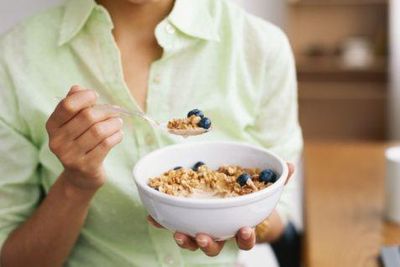If you've recently been diagnosed with irritable bowel syndrome (IBS), then you're likely coping with chronic abdominal discomfort or pain, bloating and changes in bowel habits. These symptoms can cause physical and psychological discomfort. Discovering an IBS management plan that works for you likely will involve trial and error at first and changes along the way.
With IBS, your bowel is sensitive to stimuli. Identifying what triggers your abnormal bowel function can help prevent or minimize your symptoms. Here are some tips that might help:
- Eat at regular hours.
- Chew food slowly and thoroughly.
- Avoid large or high-fat meals or excess caffeine.
- Get regular physical activity. It can help relieve the symptoms of anxiety and promote good bowel function.
- Avoid delaying the urge to have a bowel movement.
- Avoid straining during a bowel movement; try to relax and take your time.
Because your colon is more sensitive and reactive if you have IBS, ordinary events such as eating and distention from gas or having other material in the colon can trigger symptoms. The following strategies may help prevent attacks:
- Follow an eating schedule. Eating causes contractions of the colon. Normally, this response may cause an urge to have a bowel movement within 30 to 60 minutes after a meal. If you have IBS, this urge may come sooner and trigger cramps and diarrhea.
- Eat smaller meals. The strength of the response is often related to the number of calories in a meal and especially the amount of fat. Large meals can cause cramping and diarrhea in people with IBS. Symptoms may be eased if you eat smaller meals more often or just eat smaller portions. But try to stay on a regular eating schedule either way.
- Try dietary changes. For some people, a low-fat, higher-fiber diet may help. Other people feel better with a high-protein, low-carbohydrate diet. Fat greatly stimulates colon contractions after a meal. Caffeine causes loose stools in many people and is more likely to affect those with IBS. Your diet needs to be individualized for you.
- Consider dietary fiber. Dietary fiber may lessen constipation in many cases but does not lessen pain. Whole-grain breads and cereals, beans, fruits and vegetables are good sources of fiber. (Over-the-counter fiber supplements can also provide valuable fiber, but consult your health care professional before using them.)
- Review your medications. Certain medicines (including antibiotics) may trigger IBS attacks in some people. Be sure to tell all your health care professionals about your condition and discuss medication options that can avoid triggering IBS symptoms.
- Practice stress reduction. Physical, emotional and environmental stress may exacerbate or trigger symptoms. Stress-reduction and relaxation strategies can help relieve or prevent IBS symptoms. Cognitive or behavioral therapy, stress-management counseling, hypnosis and relaxation may reduce IBS symptoms.
These treatments also reduce anxiety and other psychological symptoms. You may want to keep a record of what events and activities trigger your symptoms. In the case of IBS symptoms that are linked to childhood abuse or trauma, discovering the connection helps many patients gain better control of the disease.


